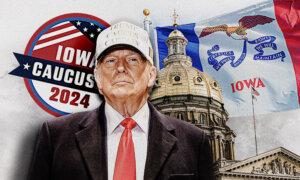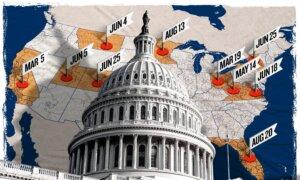DES MOINES, Iowa—Little more than half an hour after the Iowa caucuses began, the results thundered in: former President Donald J. Trump had notched a definitive victory.
One rival moved fast and broke up a once-ambitious campaign.
Despite months of strenuous campaigning, Vivek Ramaswamy, a businessman, endured a distant fourth-place finish in the Hawkeye State.
The very next day, Jan. 16, the entrepreneur and “anti-woke” investor joined President Trump at a rally in the Granite State, where he delivered a characteristically high-energy pitch for the top candidate.
On stage in Atkinson, New Hampshire, President Trump wore a wry smile as Mr. Ramaswamy sang his praises.
“He has a big, beautiful, bright future ahead,” President Trump said of the 38-year-old Mr. Ramaswamy.
With New Hampshire’s Jan. 23 primary now less than a week away, Mr. Ramaswamy’s moves raise a few questions.
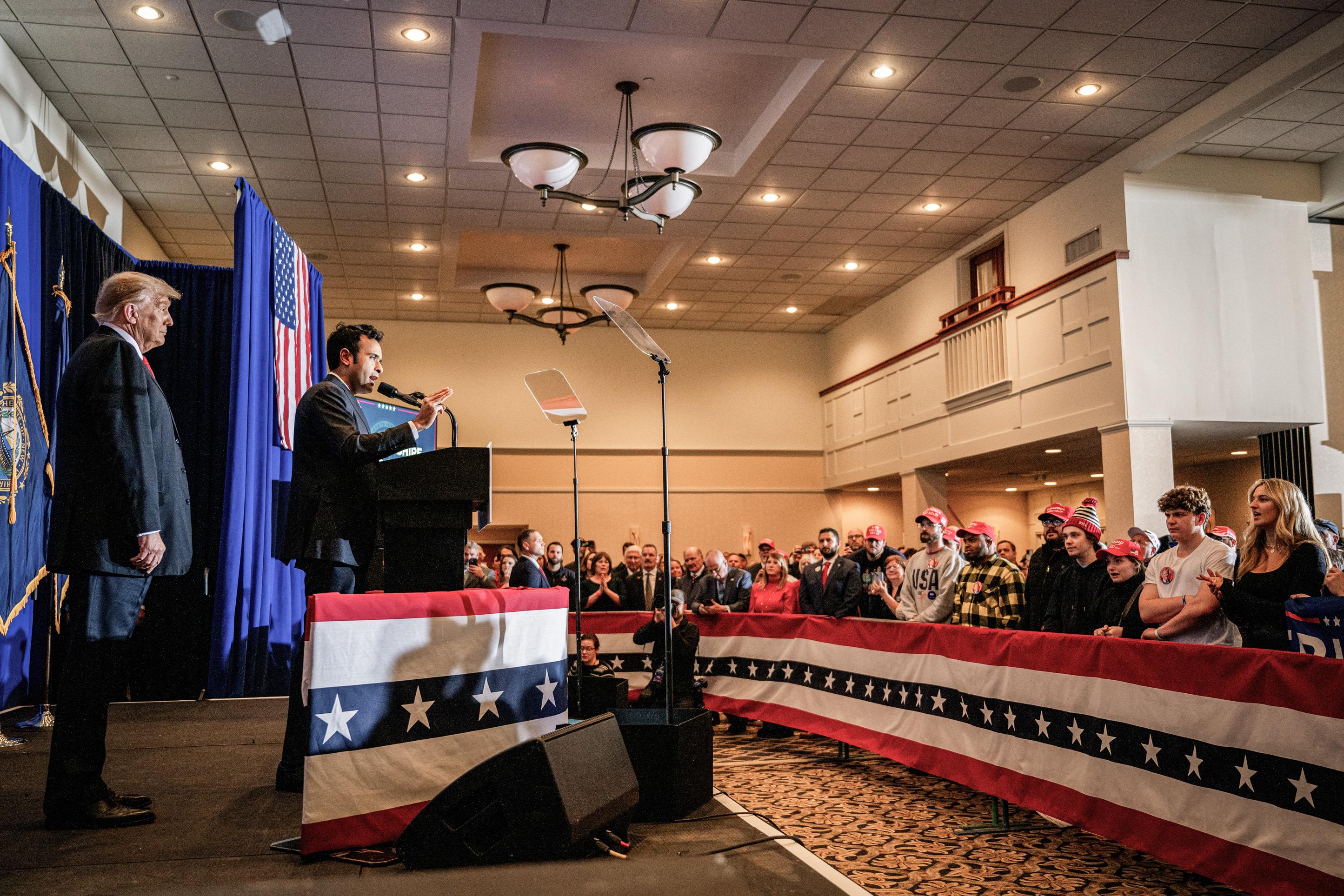
After exiting the presidential primary race, Vivek Ramaswamy endorses former President Donald Trump during a campaign rally in Atkinson, N.H., on Jan. 16, 2024. (Brandon Bell/Getty Images)
‘Trump 2.0’
Wayne Steger, a prolific scholar on primaries and a professor of political science at Chicago’s DePaul University, has consistently expressed skepticism about Mr. Ramaswamy’s candidacy.
In June of 2023, he predicted to The Epoch Times that there will be a “near-zero chance that Vivek Ramaswamy gets traction.”
“His departure from the race won’t make much of a difference,” Mr. Steger told The Epoch Times on Jan. 17.
“Most of these votes are going to Trump, which they would anyway, even if he remained in the race. He might have done okay in New Hampshire, but I doubt it,” Mr. Steger said.
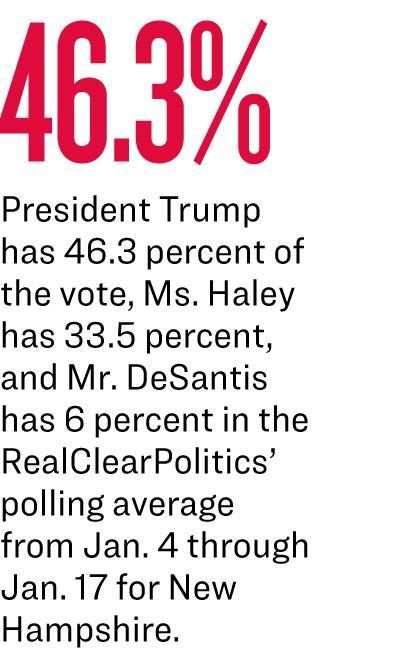
“I would anticipate Haley doing better in New Hampshire, [Florida Gov. Ron] DeSantis worse, and Trump about the same,” he predicted.
James Hartman, a Republican political consultant who supports Ms. Haley, but isn’t working on her campaign, said Mr. Ramaswamy’s backing could help President Trump, but added a caveat.
“The thing with endorsements, however, is they don’t usually translate in a one-to-one ratio when you’re changing venues because there are so many other variables,” he said.

Republican presidential candidate former U.N. Ambassador Nikki Haley at a campaign event in Ames, Iowa, on Jan. 14, 2024. (Joe Raedle/Getty Images)
“Mr. Ramaswamy has positioned himself as Trump 2.0 from the get-go. So, certainly, we would expect his folks to move in that direction. Nonetheless, don’t underestimate the ability of voters to think for themselves,” Mr. Hartman said.
Mr. Hartman pointed out that Iowa hasn’t predicted non-incumbent nominees very often. Sen. Ted Cruz (R-Texas) won it in 2016. It went to then-Sen. Rick Santorum (R-Penn.) in 2012. In 2008, Arkansas Gov. Mike Huckabee beat former Massachusetts Gov. Mitt Romney, Rep. Ron Paul (R-Texas), and other contenders in the Hawkeye State. The last non-incumbent to take Iowa was George W. Bush, whose name is emblematic of the older Republican leadership from which many younger GOPers are seeking to separate themselves.
But President Trump is no ordinary non-incumbent—and few liken his populist message to that of the younger Bush.
“It’s highly likely that, for many of Mr. Ramaswamy’s supporters, Mr. Trump is the second choice, so he is the most likely to benefit,” Mr. Polborn told The Epoch Times.
“The same is true for Mr. DeSantis if he were to drop out. Those media outlets that are talking about the ‘non-Trump vote’ and add the vote shares for all the other candidates are living in a fantasy world.”

Journalists cram into the back of a ballroom for a campaign rally with former President Donald Trump in Portsmouth, N.H., on JN. 17, 2024. (Chip Somodevilla/Getty Images)
New Hampshire’s Unpredictability
One man who really knows the ins and outs of the first-in-the-nation primary is New Hampshire’s former secretary of state, Bill Gardner.
Mr. Gardner, a Democrat, served in the role for decades. He told The Epoch Times that he objected to the increasing politicization of a role that was once above the fray of partisan politics. He said “Democrats in particular” sought to convene and strategize apart from the non-partisan National Association of Secretaries of State, which he once led as president.
He didn’t offer any opinions of President Trump, Ms. Haley, Mr. Ramaswamy, or any other candidate. But he noted that New Hampshire’s primary has sometimes seen an unexpected victory for “the little guy” that ripples across the nation.
He cited the March 1968 Democratic primary, which took place in the midst of the Vietnam War. Eugene McCarthy, an anti-war senator from Minnesota, came in second to President Lyndon B. Johnson. His share of the vote was enough to spark debate about President Johnson’s re-electability. The incumbent dropped out of the race a few weeks later.
That year’s Democratic primary season, which saw the entry and assassination of Robert F. Kennedy, Sr., culminated in the 1968 Democratic National Convention in Chicago. Protesters and police clashed in clouds of tear gas in a feverish scene straight out of 2020.

New York delegates hold ‘stop the war’ banners to protest the United States’ continued involvement in the Vietnam War, on the third day of the 1968 Democratic National Convention, in Chicago on Aug. 28, 1968. (Pictorial Parade/Archive Photos/Getty Images)
The Democrats will hold their 2024 convention in Chicago once again. A war unpopular with much of the Democratic base—in this case involving Israel—could again provide the backdrop.
President Joe Biden is expected to sail to the nomination, though his name is absent from New Hampshire’s primary ballot—the state has come into conflict with the Democratic National Committee (DNC) over the first-in-the-nation status, which it has refused to cede to South Carolina. New Hampshirites like Mr. Gardner will remind you that being first is enshrined in the state constitution.
The former secretary of state pointed out that the Democratic division in 1968 came as a surprise to some. By contrast, the Republican contest, which some expected to be raucous, ended with Richard Nixon securing the nomination at a relatively peaceful convention.
Could 2024, like 1968, unexpectedly prove more chaotic for Democrats than for Republicans?
Mr. Gardner didn’t rule it out: “Does history always repeat itself? No. But does it sometimes repeat itself?”
Non-Trump Candidates Face Mounting Odds
Before Iowa’s caucuses, the backers of other candidates held out hope for strong finishes there, in some cases dismissing survey results and other indices of President Trump’s support.
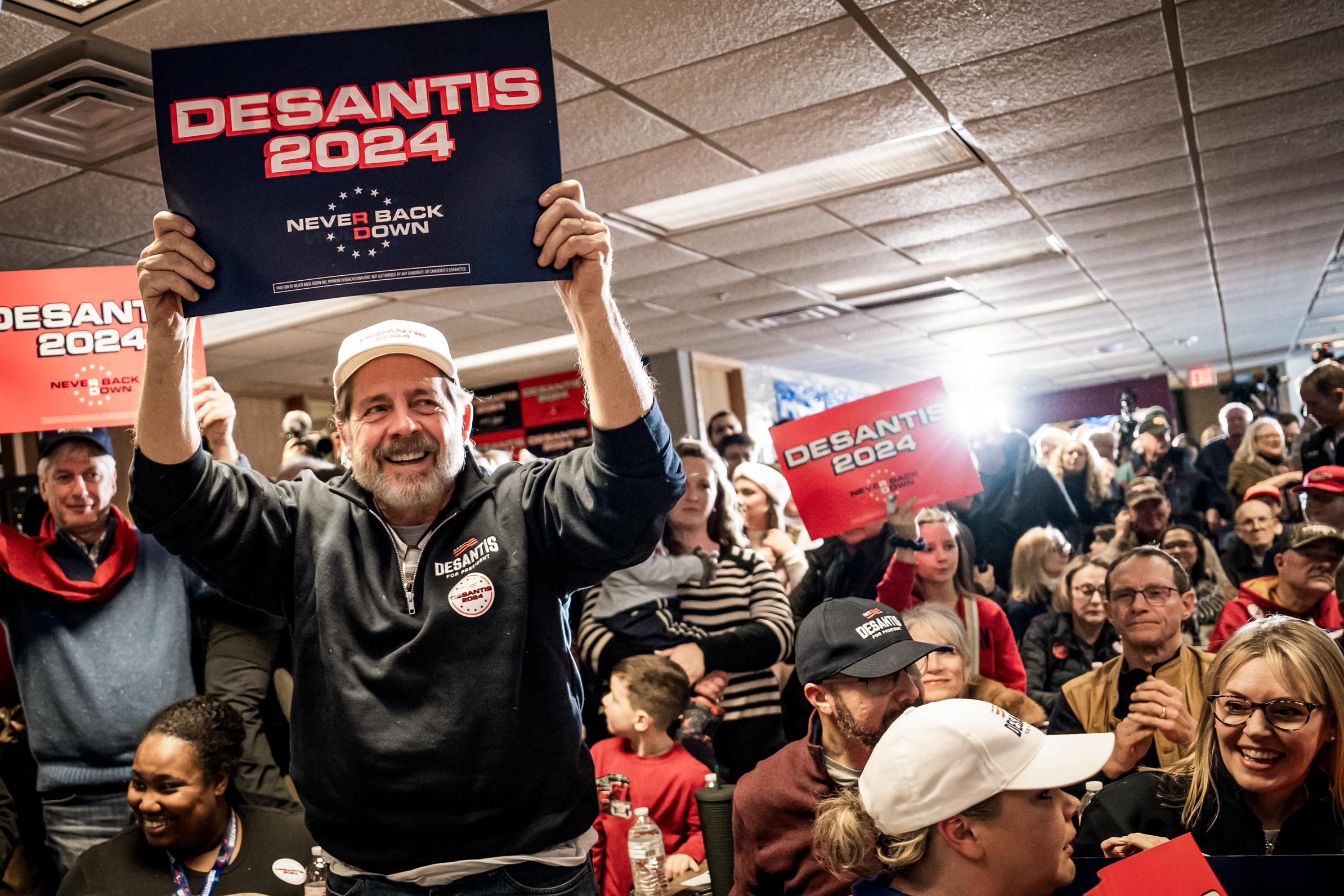
People attend Republican presidential candidate Florida Gov. Ron DeSantis’ campaign event in Des Moines, Iowa, on Jan. 13, 2024. (Madalina Vasiliu/The Epoch Times)
The DeSantis campaign is also redirecting its energy from New Hampshire to South Carolina, meaning the candidate will have a reduced footprint in the Granite State ahead of its primary.
It looks more and more likely that President Trump will lock up the nomination.
But it isn’t over until it’s over—and the various criminal cases against President Trump mean the former leader of the United States could be locked up himself.
Mr. Polborn laid out an improbable but not impossible series of events that could lead the other candidates to matter more in the end, notwithstanding President Trump’s growing strength.
“If Trump eventually has to drop out; say, he is offered a deal by the DOJ [Department of Justice] that gets him out of all legal troubles, in exchange for dropping out of the race—not that likely, but not an impossible scenario either—then it conceivably matters who was the ‘last non-Trump candidate standing’ in order to make a claim on the nomination,” he said.
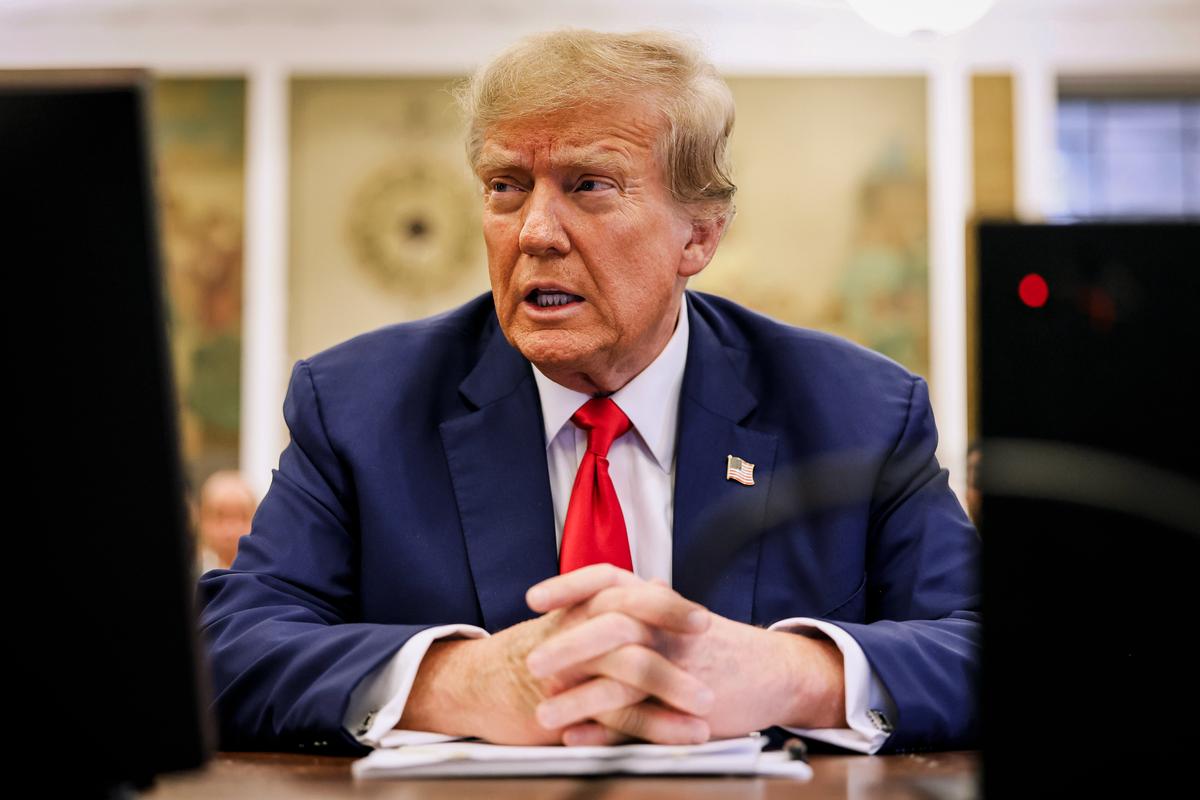
“The Republican primaries are simply not a good institution to deal with this scenario.”
Mr. Gardner, the former New Hampshire secretary of state, didn’t comment on the presidential horse race. He stressed his state’s open filing period, saying it is designed to “give the little guy a chance” by minimizing the barriers to entry for those seeking to run for president.
While Mr. Gardner was hesitant to speak to the specifics of any candidate, Mr. Steger came to a blunt conclusion.
“There is no viable path to the nomination for the not-Trump candidates,” he told The Epoch Times.
Mr. Hartman, the Haley supporter, didn’t discount that point of view.
“I don’t necessarily disagree with the assessment. I just don’t like it,” he said.
Original News Source Link – Epoch Times
Running For Office? Conservative Campaign Consulting – Election Day Strategies!

